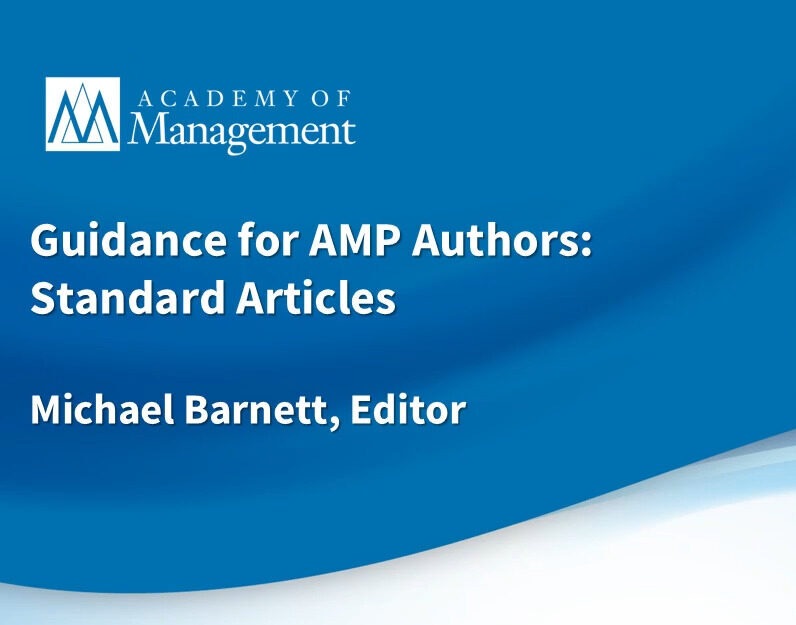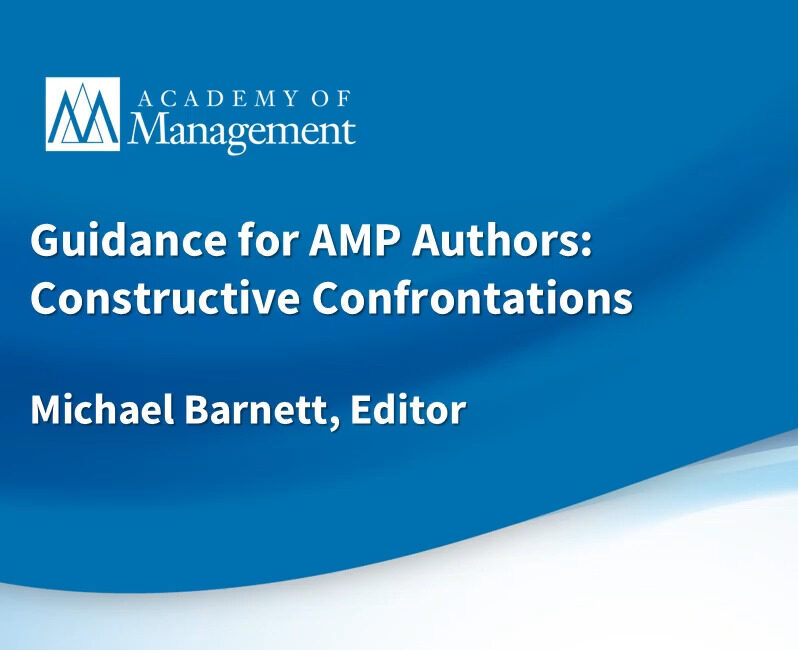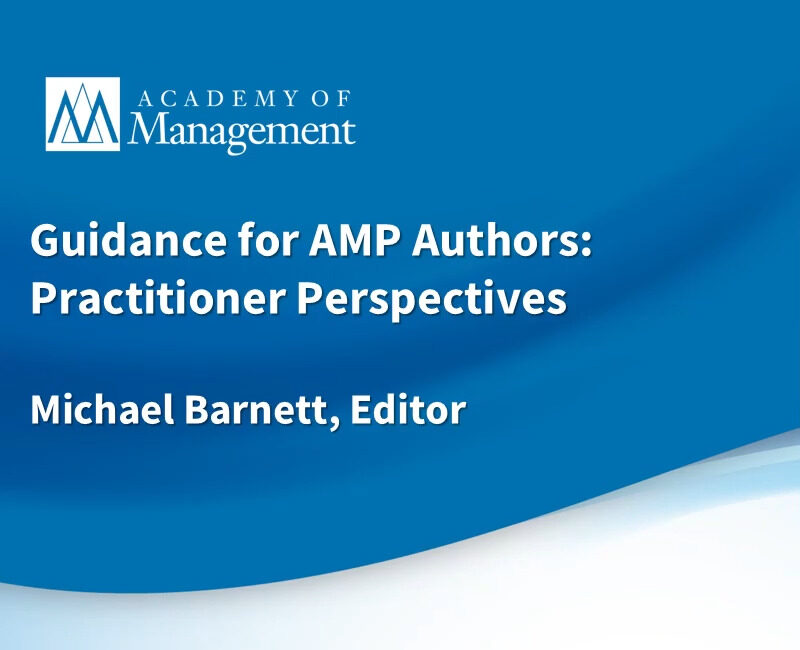Submitting to
Academy of Management Perspectives
We welcome your manuscripts at Academy of Management Perspectives (AMP)!
Please ensure your manuscripts follow AMP’s guidelines for a successful submission.
AMP manuscripts must be:
- Relevant: Manuscripts should focus on an issue that matters to managers. The managerial issue must be front and center, well-supported, and maintain central focus throughout the manuscript. AMP does not publish theory driven papers, even if they have managerial implications tacked on.
- Rigorous: Manuscripts should present rigorous original analysis of an issue that is clearly important to managers. AMP does not publish opinion pieces, or practical translations of previously published studies. AMP’s standards of rigor and originality are the same as any other top scholarly journal. Manuscripts should meet current standards of scientific rigor, so managers can rely on it.
- Readable: AMP papers summarize complex methods and analyses in the body of the paper, while the explicit details are placed in supplements. At AMP, papers are about 1/3rd shorter than standard academic articles. AMP also uses endnotes rather than footnotes. If your manuscript is not written in a way that connects with thoughtful practitioners, then it is not suited to AMP. Please do not submit a paper to AMP that was rejected at a standard journal without first substantively rewriting it to fit AMP’s style.
Before submitting to Academy of Management Perspectives (AMP), please review our mission statement and ensure your work fits within our scope. Additional details of work suited to AMP are provided in these four editorials:
- Mattering Matters: Explaining What Fits at Academy of Management Perspectives
- (Re)Building a Bridge between Scholars and Practitioners: Get AMPed!
- Management Practice and Policy: A Guide to Writing for AMP
- Crafting Credible and Compelling Conceptual Contributions
Please note that AMP accepts three types of manuscripts:
We describe each type of manuscript below and provide a template for formatting each.
Submission Requirements
When authors submit their manuscript to AMP for publication consideration, they agree to abide by AMP’s publication requirements. Specifically, an author must:
- Agree that the manuscript is not under review for publication elsewhere and will not be submitted to another publication entity during the review period at AMP;
- Confirm that the manuscript has not previously been submitted to AMP for review. (Note that neither publication in Academy of Management Annual Meeting Proceedings nor presentation at a conference disqualifies a manuscript from submission to AMP); and
- Agree that working papers, prior drafts, and/or final versions of submitted manuscripts that are posted on a website (e.g., personal, departmental, university, or working series site) will be taken down during the review process.
Submission of a manuscript to AMP carries an implicit quid pro quo: willingness to review for AMP. The cornerstone of the editorial process at AMP is the willingness of colleagues to provide each other feedback through peer review. Authors who submit manuscripts to AMP for review are expected to reciprocate by reviewing for AMP if called upon to do so.
Articles
Most AMP publications are standard articles. AMP articles provide rigorous original analysis that clearly informs important issues of managerial practice or policy. There is no one-size-fits-all structure for doing this. However, there are specific types of content contained in such articles. The open call for papers explains this, and the template is provided below. Authors are NOT required to follow this template, but articles should address the content contained within it.
An AMP article is managerially relevant because it is motivated by a phenomenon of importance to economic, organizational, social, or political processes and not by filling a gap in theory. But to be relevant, AMP articles must also be rigorous. There is no reason to heed AMP’s content if the work, no matter how practical, is not evidence based and of the highest academic standards. In addition, AMP articles must be well grounded in the relevant literature, and they must accurately, thoroughly, and objectively represent the current state of this literature, warts and all.AMP articles may be empirical or conceptual. Empirical papers in AMP use quantitative or qualitative analysis to distinguish the nature and characteristics of pertinent problems of practice and policy and to guide managerial actions toward effective resolutions. Conceptual analysis is used in AMP to systematically organize relevant literature into novel perspectives that aid practical understanding of managerial problems.
Brevity is the soul of rigorous relevance. An AMP manuscript should be no longer than 20 double-spaced pages. Authors also save space by presenting empirical materials in a simplified format. Tables, detailed descriptions of methods, robustness tests, and so forth that are essential to rigorous empirical studies are placed in supplements, not in the body of the paper. These “Additional Materials” supplements are submitted throughout the review process and posted in their final format online when a paper is accepted for publication. Moreover, AMP favors plain, concise language in lieu of academic jargon. AMP generally follows the AOM Style Guide for Authors, but: AMP uses endnotes instead of in-text citations, reference lists, and footnotes. Incorrect formatting is not a sole reason to reject a manuscript, however; authors are provided leeway in early rounds.
An AMP paper begins with an engaging but accurate title and a concise abstract of no more than 200 words. These items should provide potential readers with enough, but only just enough, information to quickly and accurately determine if the article is relevant to them. Specifically, the abstract should state (a) the important managerial issue motivating the paper, (b) how the paper analyzes this important issue, (c) what the analysis finds, and (d) how these findings substantively affect practice or policy.
Constructive Confrontations
Academic debates can be fun. But frequently they are inconsequential and inconclusive. Opposing authors tend to talk past each other, agreeing to disagree, and leaving core issues unresolved. Readers may be left without a conclusion and with more confusion.
In contrast, Constructive Confrontations articles at Academy of Management Perspectives (AMP) are designed to abate ongoing debates about important managerial issues by bringing scholars with conflicting perspectives together as co-authors. Co-authors cooperate on a mutually agreed study rather than talk past each other through independent, contrasting essays. Please see this article for an explanation of the importance of this format.
Co-authors of Constructive Confrontations must be credited authors on previously published articles that are germane to opposing sides of the debated managerial issue. Intended co-authors are strongly encouraged to submit a proposal before writing a Constructive Confrontations article. The proposal template is available here. Email completed proposals to Mike Barnett, AMP Editor. Please write “Constructive Confrontations Proposal” in the subject line. After reviewing the proposal, the editor will either encourage or discourage submission of a full article, based upon the practical relevance and importance of the topic, the relevance of prior publications of the co-authors, and the rigor and relevance of the proposed study. Note that editorial encouragement of a proposal has no bearing on the peer review process, but it does reduce the likelihood of desk rejection.
Constructive Confrontations are similar to standard articles. They are the same length as standard AMP articles (20 double-spaced pages) and, likewise, engage in rigorous original conceptual or empirical analysis. They must be submitted through AMP’s online manuscript management system and will be double-blind peer reviewed. Accordingly, they must be written in a way that does not identify the co-authors. Therefore, do not frame the debate as the work of one set of authors versus that of another. Instead, embed the work of each set of authors within a review and synthesis of a broader set of studies that support contrasting perspectives.
There is no required format for Constructive Confrontations, but the following structure or something similar is recommended.
AMP papers must have an engaging but accurate title and a concise abstract of no more than 200 words that provides potential readers with enough, but only just enough, information to quickly and accurately determine if the article is relevant to them. The abstract should succinctly state (a) the important managerial issue that is the subject of debate, (b) conflicting perspectives on this issue, (c) how this paper analyzes the debate, (d) the results of the analysis, and (e) how these results abate the debate.
Though it is not in the above format, please see here for an example of a co-authored study that sought to resolve a debate about a managerial issue. Further, please note that an article that abates a managerially relevant debate can also be submitted as a standard article and be written by authors who have not staked out a side previously. See above for a description of our standard article format. See here for an example of an article of this type, though not in AMP format.
Practitioner Perspectives
Academy of Management Perspectives (AMP) publishes rigorous academic studies that are of relevance to important issues of managerial practice and policy. But as decades of striving to matter to managers has shown us, a great many of those who can conduct rigorous academic studies are not well-versed in what matters to managers. To better understand what matters in the “real world,” academics must stop talking at, and start co-creating with, practitioners. To that end, AMP welcomes Practitioner Perspectives essays.
Note that these are essays, NOT standard articles. Their intent is to identify important areas of practice and policy for which managers still need rigorous scholarly insights. But the essays themselves are not rigorous original conceptual or empirical studies. If you are providing a solution to an important managerial problem, such as a new framework, then please submit a standard article (which will need to be supported with rigorous scholarly analysis, as described above). Also note that collaboration between a practitioner and a scholar does not make a manuscript a Practitioner Perspectives essay. Such collaboration is also a welcome feature of our standard articles. More generally, be aware that a Practitioner Perspectives essay is not a less rigorous route to a traditional scholarly contribution; it is a different path with different aims. These essays outline issues that need to be addressed, based on the direct experiences of senior practitioners, so that others can tackle them through rigorous scholarly analysis.
Practitioner Perspectives essays must be co-authored by a senior practitioner with direct and extensive experience with an important managerial issue and; a scholar with significant expertise in that same area. Practitioner Perspectives essays draw on the direct experiences of the practitioner to bring attention to an important area of managerial practice or policy and combine this with the expertise of the academic to clarify what is already known and jointly chart a path forward.
Intended co-authors are strongly encouraged to submit a proposal before writing a Practitioner Perspectives essay. The proposal template is available here. Email completed proposals to Mike Barnett, AMP Editor. Please write “Practitioner Perspectives Proposal” in the subject line.
After reviewing the proposal, the editor will either encourage or discourage submission of a full essay, based upon the practical relevance and importance of the topic, as well as the relevant qualifications of the co-authors. Practitioner Perspectives may be as long as standard AMP articles (20 double-spaced pages), but their minimum length is 10 double-spaced pages. Full essays must be submitted through AMP’s online manuscript management system. Given the inability to mask the co-authors in this format, Practitioner Perspectives are single-blind peer reviewed. Note that editorial encouragement of a proposal has no bearing on the peer review process for the full essay, but it does reduce the likelihood of desk rejection.
There is no required format for the full essay, but the following structure or something similar is recommended.
AMP papers must have an engaging but accurate title and a concise abstract of no more than 200 words that provides potential readers with enough, but only just enough, information to quickly and accurately determine if the article is relevant to them. For this type of essay, the abstract should succinctly state (a) the important managerial issue motivating the essay, (b) the relevant qualifications of the co-authors to inform this issue, (c) what is known about this issue, practically and academically, and (d) aspects of this issue that require further study.
Formatting
In general, AMP follows the AOM Style Guide for Authors. However, there is one explicit exception: AMP uses endnotes instead of in-text citations, reference lists, and footnotes.
Endnote examples
Book with single author
- Cheryl Strayed, Wild: From Lost to Found on the Pacific Crest Trail (New York: Alfred A. Knopf, 2012), 87–88.
- Strayed, Wild, 261, 265.
A book with an editor in place of an author includes the abbreviation ed. (editor; for more than one editor, use eds.). Note that the shortened form does not include ed.
- Meghan Daum, ed., Selfish, Shallow, and Self-Absorbed: Sixteen Writers on the Decision Not to Have Kids (New York: Picador, 2015), 32.
- Daum, Selfish, 134–35.
Book with Multiple Authors
- Brian Grazer and Charles Fishman, A Curious Mind: The Secret to a Bigger Life (New York: Simon & Schuster, 2015), 188.
- Grazer and Fishman, Curious Mind, 190.
Book with Author plus Editor or Translator
- Gabriel García Márquez, Love in the Time of Cholera, trans. Edith Grossman (London: Cape, 1988), 242–55.
- García Márquez, Cholera, 33.
Chapter in an Edited Book
- Glenn Gould, “Streisand as Schwarzkopf,” in The Glenn Gould Reader, ed. Tim Page (New York: Vintage Books, 1984), 310.
- Gould, “Streisand as Schwarzkopf,” 309.
Journal Article
- Benjamin Bagley, “Loving Someone in Particular,” Ethics 125, no. 2 (January 2015): 484–85.
- Bagley, “Loving Someone in Particular,” 501.
The URL in the following example indicates that the article was consulted online; in this case, it is based on a DOI and is preferred to the URL that appears with the article.
- Jui-Ch’i Liu, “Beholding the Feminine Sublime: Lee Miller’s War Photography,” Signs 40, no. 2 (Winter 2015): 311.
- Liu, “Beholding the Feminine Sublime,” 312.
To ease the burden on authors, initial submissions are given leeway on formatting. Manuscripts will not be rejected solely on the basis of improper formatting. However, as an aid to reviewers, authors are encouraged to follow our format from the start. All manuscripts must fully comply with AMP formatting as a condition of acceptance.
Submission Process
Follow the instructions for the web-based submission system at Manuscript Central. If you need assistance uploading your paper, please contact the ScholarOne helpline on weekdays (Monday – Friday) between 24:00 – 20:30 ET (GMT-5) at +1-434-964-4100 or 1-888-503-1050 (US). You may also email them to [email protected] or visit their “get help now” website at: GET HELP NOW!
Go to the AMP Manuscript Central Website and log in. On the right-hand side, you will see a box that says New User? Click on “Register here.”
Registering is a three-step process:
- Email and name: Enter salutation, name, and email address
- Address: Enter mailing address
- User ID & password: Here, you must create a password.
- Keyword: We require that you submit three keywords for each document you are submitting. From the drop-down menu of keywords, select a keyword, then click Add
- Unavailable dates: This is only for reviewers. Please leave blank.
- Signature: Insert your name and title.
- Browse: This should be left blank; you will upload your document later.


